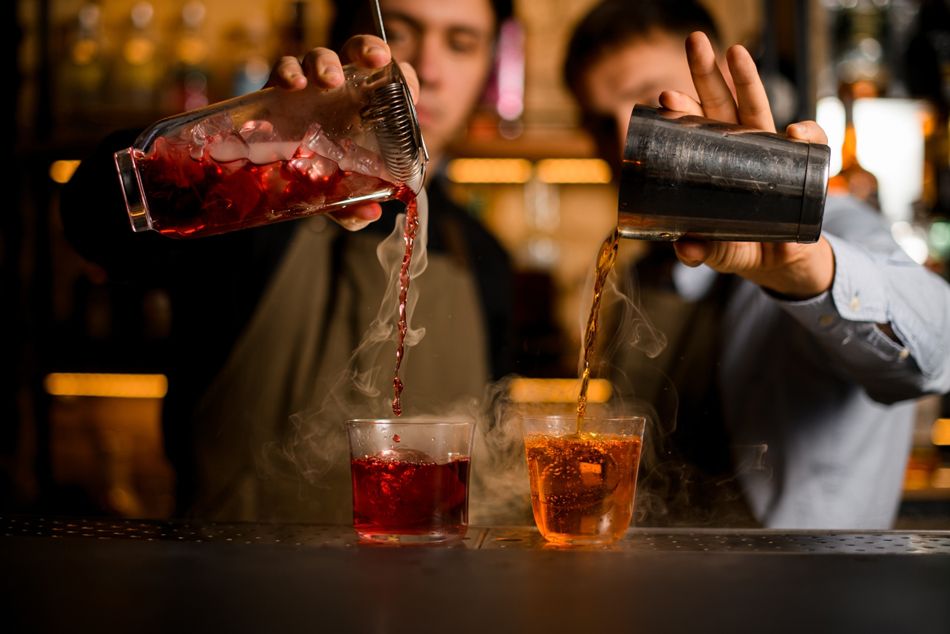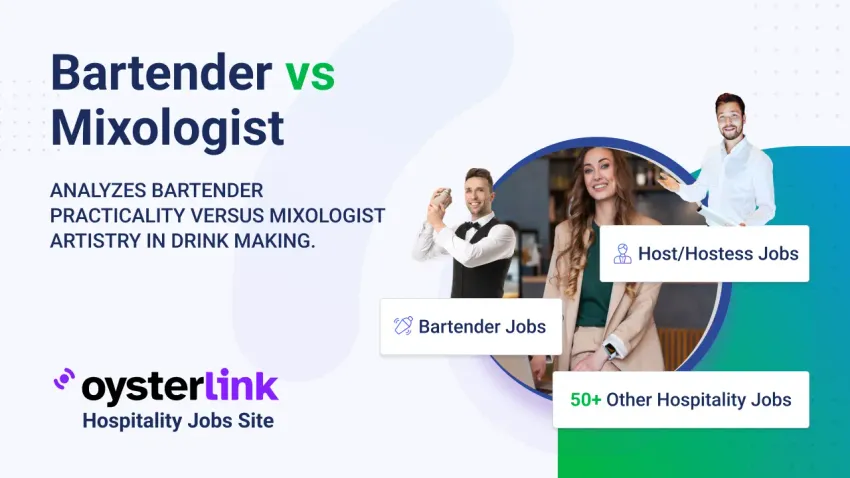Understanding the differences between a Bartender vs Mixologist is important for anyone considering a career behind the bar or looking to level up their skills.
In this article, we’ll break down what each role involves so you can decide which path suits your goals best.
Historical Evolution of Bartending and Mixology
Understanding the historical evolution of bartending and mixology provides valuable context to their modern distinctions.
Bartending, as a profession, dates back to ancient civilizations where tavern owners would serve fermented beverages to travelers.
The role evolved over centuries, with Bartenders becoming central figures in social establishments, responsible for serving drinks and ensuring patron satisfaction.
Mixology, on the other hand, emerged as a specialized craft in the 19th century, focusing on the art and science of creating cocktails.
Pioneers like Jerry Thomas, often referred to as the "father of American mixology," elevated the practice by introducing innovative techniques and recipes, laying the foundation for modern cocktail culture.
Definitions and Key Differences of a Bartender vs. a Mixologist
Knowing these differences can help you make an informed decision about your career or better appreciate the craft behind your favorite cocktails.

What Is a Bartender?
A Bartender works in establishments such as bars, hotels or restaurants and is responsible for pouring and mixing classic drinks. They have extensive knowledge of different types of cocktails that are typically served in such venues.

Bartenders should be able to memorize recipes for classic drinks without having customers reference the ingredients. For example, if a customer orders a Tom Collins, the Bartender should know that this drink consists of gin, lemon, simple syrup and club soda.
They often take orders directly from customers and have to ensure their overall experience at the establishment is enjoyable. In addition to making drinks, Bartenders often manage customer expectations, maintain inventory and uphold the bar’s atmosphere. Another aspect of the role is keeping the bar area clean and organized.
What Is a Mixologist?
A Mixologist is an individual who has received education in the history of mixing drinks and creating cocktails. They are knowledgeable on the topic of cocktail ingredients and know various mixing techniques.

Mixologists often combine their traditional knowledge and innovative ideas to come up with new cocktail recipes. While Mixologists may also pour and serve drinks like Bartenders, their focus is on designing and creating new drinks. Their expertise often extends to understanding flavor profiles, experimenting with unusual ingredients and bringing unique drink experiences to life.
Differentiating a Bartender vs. a Mixologist
To put it simply, a Bartender is a person who offers quick service to customers by creating and serving classic drinks in bars and restaurants.
They work at high speeds and have to keep up with a large number of orders. Their goal is to serve everyone at the establishment properly and maintain a friendly and enjoyable atmosphere.
A Mixologist may do the same but their focus is on the art and science behind cocktail-making. Unlike Bartenders, they experiment with different ingredients and create unique specialty cocktails.
They take more time to understand flavors, textures and how different drinks work together. They're often seen as artists in their field of work, constantly coming up with new creations.
In short: Not all Bartenders can be called Mixologists, but many Bartenders may aspire to move into Mixology.
Here’s a video from Davey Francis, a Bartender based in Las Vegas, sharing an interesting take on the difference between the two.
Roles and Responsibilities of a Bartender vs. a Mixologist
Now that you know the difference between a Bartender and a Mixologist, let's examine what each of them does in their workday routine.
Key Responsibilities of a Bartender
A Bartender is the key figure in establishments that serve alcohol. They assume responsibility for everything behind and at the bar which includes:
- Drink preparation: A Bartender mixes and serves a variety of alcoholic and non-alcoholic beverages. They should be familiar with all classic recipes and be able to make suggestions to customers based on their preferences.
- Legal compliance: Bartenders should be aware of local laws and regulations regarding alcohol service. Some states in the U.S. require individuals in this role to have a bartending license, proving they've completed a program in responsible alcohol service.
- Cash handling: Besides preparing drinks, a Bartender often serves drinks to customers. Therefore, they're also responsible for handling money and balancing the cash register.
- Inventory management: It's up to a Bartender to manage items in the bar's inventory. This includes spirits, mixers, garnishes and other bar supplies.
- Sanitation: Hygiene is extremely important in all establishments that serve food and drink. That said, a Bartender needs to tend to the bar area and keep it clean at all times. This includes washing glasses and bar equipment, cleaning spills, and maintaining overall tidiness.
- Customer service: A Bartender often interacts with customers. They take orders, serve drinks and often engage in conversations with them.
Key Responsibilities of a Mixologist
Like a Bartender, a Mixologist works behind the bar. While their job often sees them performing the same duties as a Bartender, their key responsibilities are centered on drink creation. This includes:
- Cocktail creation: A Mixologist comes up with new cocktail creations. They experiment with different ingredients to create new drinks for the establishment to serve.
- Trend analysis: Mixology is a dynamic field, with new drinks being invented on a regular basis and new ingredients being introduced. A Mixologist needs to stay on top of these trends and use this knowledge when creating new drinks.
- Presentation: The drinks a Mixologist creates should not only taste good, but also look good. It's up to them to work on the aesthetics and overall visual appeal of their cocktails.
- Education: Once a Mixologist comes up with a new drink for the establishment to serve, they must teach Bartenders how to make it.
- Customer interaction: A Mixologist may often find themselves talking to customers about their creations and the techniques they use when inventing new drinks.

Key Skills Required for Each Role
Every role in the hospitality industry demands a unique blend of skills, but some abilities transcend job titles and contribute to overall success. One such skill is flair bartending.
Flair bartending introduces an element of entertainment to the bar experience through the artful manipulation of bar tools and bottles.
This practice involves performing tricks such as juggling, flipping, and spinning while preparing drinks, captivating patrons with a dynamic display. While flair bartending emphasizes showmanship, it also requires precision to ensure that cocktails are crafted correctly amidst the theatrics.
Although some skills required for Bartender and Mixologist positions overlap, each role also demands some unique qualities that are needed for their line of work. Let's examine these specific skills.
Top 5 Skills a Bartender Should Have
A Bartender needs a range of skills to keep bar operations efficient and maintain customer satisfaction. While they may require a range of skills to begin with, they develop various other skills while working behind the bar. Over time, they gain a better understanding of how to interact with customers and become better at multitasking.
That said, a good Bartender needs to have the following skills:
- Basic mixing
- Organization
- Efficiency
- Communication skills
- Endurance
Top 5 Skills a Mixologist Should Have
A Mixologist needs to possess skills that surpass the basics of bartending as their role focuses more on the science of creating drinks. However, they also learn on the go and keep introducing new cocktail-making techniques into their work. The key skills they need are:
- Creativity
- Precision
- Presentation
- Research
- Detailed knowledge of alcoholic beverages
Bartender vs. Mixologist: Conclusion
Although there are some similarities between a Bartender and a Mixologist, these two roles aren't the same. The former focuses more on mixing and serving traditional drinks while the latter invents new cocktails for the establishment they work at.
Mixologists take more time with their work, experimenting with different flavors. In contrast, Bartenders prioritize efficiency and ensure all customers receive their drinks in a timely fashion.
The role of a Mixologist is a more advanced one. However, a renowned NYC Bartender Paula Lukas said that Bartenders can aim to transition to the role of a Mixologist as they progress in their careers. Individuals in both roles can eventually transition to the role of a Bar Manager.
So, even if you're just starting out as a Bartender, becoming a Mixologist in the future is certainly a possibility.
Want to learn the differences between being a Bartender vs being a Barback? We've got a great article comparing their roles, duties and skills required for both jobs.










Loading comments...